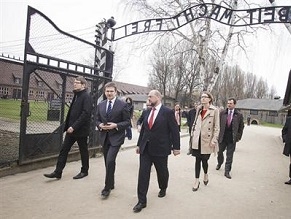|
World Jewish News

During a two-day official visit to Poland, European Parliament President Martin Schulz (C) participated in the commemorations of the Warsaw Ghetto Uprising and visited the former Nazi extermination camp at Auschwitz-Birkenau. Photo: Copyright European Uni
|
European Parliament’s Schulz participates in ‘deeply moving’ official Polish commemoration of 70th anniversary of Warsaw Ghetto
22.04.2013, Holocaust European Parliament President Martin Schulz served as Europe’s official representative at an official Polish commemoration of the 70th anniversary of the Warsaw Ghetto Uprising Friday, in what he described as a “deeply moving ceremony”. Sirens and church bells sounded to launch the official tributes to the hundreds of Jewish fighters who resisted the Nazis in 943 as part of a doomed revolt.
The ceremony at the Monument to the Ghetto Heroes in the Polish capital was led by Polish President Bronislaw Komorowski, who paid tribute to the first and largest Jewish insurrection against Nazi German forces, in resistance to their final efforts to deport its remaining residents to the Treblinka death camp, as “the last stand of people deprived of dignity and hope”. "Hundreds of insurgents stood to defend the last remnants of human freedom,” he recalled.
Granting one of Poland’s highest honours, the Grand Cross of the Order of the rebirth of Poland, to 88 year-old Holocaust survivor Simha Rotem, who had returned to the country from his current home of Jerusalem, Rotem received the award by describing Nazi resistance to the uprising as “a hell on earth”. "Persecuting the Jews appealed to the lowest of human instincts,” he added. The Jewish State was further represented by Israeli Education Minister Shai Piron to honour what was once Europe’s largest pre-war Jewish community, with 90% of its former 3.3 million-strong population being wiped out by the end of WWII in 1945. Official figures estimate its current community to stand at 7,500.
In an official tweet following the ceremony Friday, before attending the opening of the Museum of the History of Polish Jews, Schulz insisted that the “heroic rise of few hundreds with pistols against Nazi tanks is something to never forget, to get courage for our fights (sic)”.
Speaking of the long-awaited opening of the state-funded museum, with the assistance of several private donors, Polish Chief Rabbi Michael Shudrich told reporters that “the museum is for everyone: it’s for non-Jews, it’s for Jews from around the world, and it’s also for Jews who are still living here in Poland”.
Rounding out his official visit Saturday, Schulz toured the site of former Nazi death camp Auschwitz, where he laid wreaths to slain Jews in the courtyard of the renowned Block 11, declaring “you have to come here to realise how deep was the collapse of civilisation”. “When you see a child's shoe, glasses or human hair - it changes a man. And that is why, in its horrors, it is such an important place,” he added.
“I think Auschwitz was the beginning of the unification of Europe and, well, now that the European Union is committed to its preservation,” he continued, invoking the principle of ‘never again’.
As part of the tour of Auschwitz, the European Parliament head visited a gas chamber used from August 1940-July 1943, as well as taking in the museum archive. He also retraced the railway track along which the last shipment of deported Jews was delivered to the notorious death camp in Spring 1944, before writing in the museum’s visitor’s book: “I write this in memory of all the victims who have suffered the unspeakable crimes here. No sacrifice of barbarism will not be forgotten.”
Following the tour, Schulz wrote a message to his official facebook and twitter pages declaring: “The visit to Nazi German death camp Auschwitz changes you. It changed me. There are no words to describe the enormity of this crime. We must never ever forget.”
EJP
|
|
